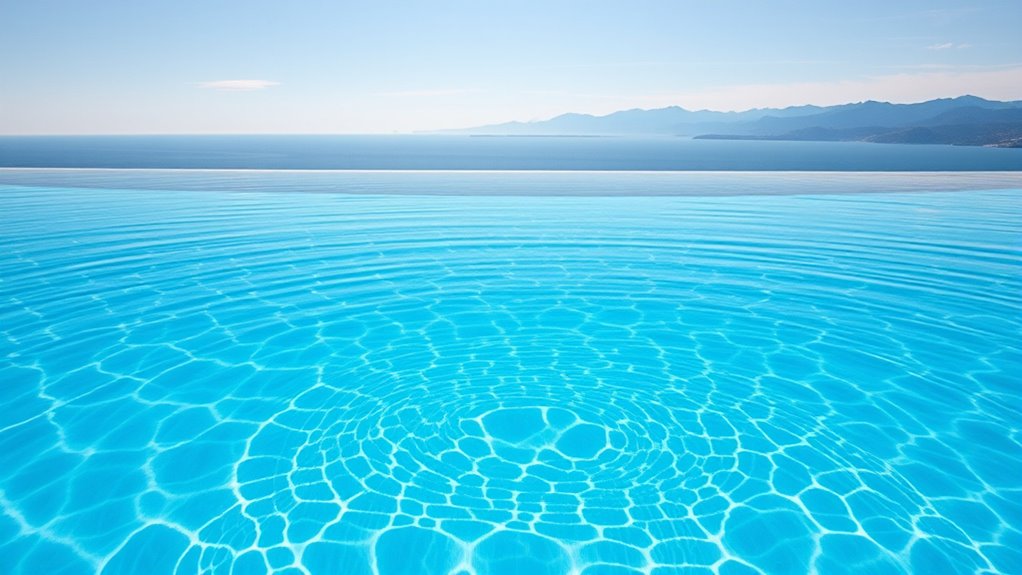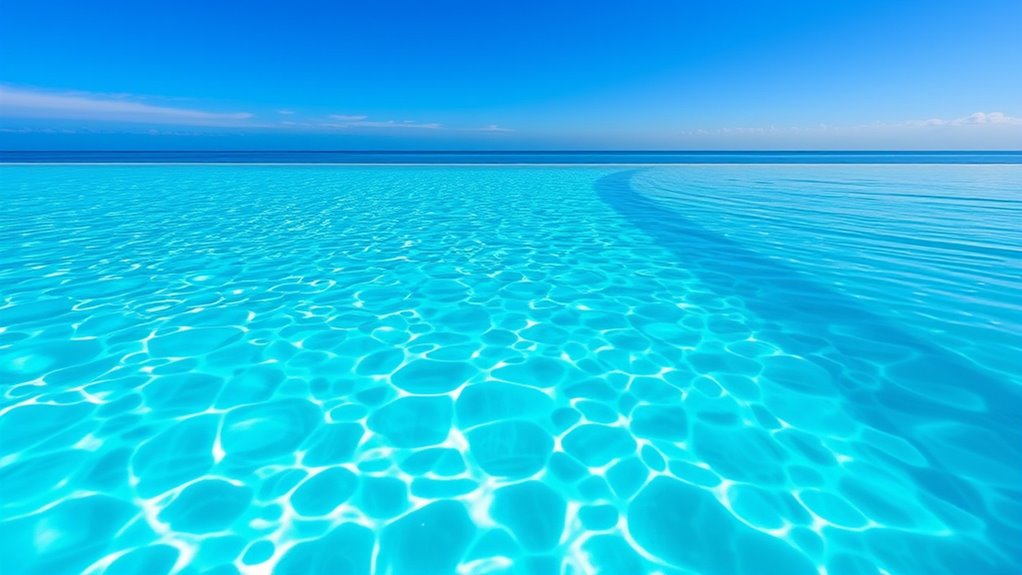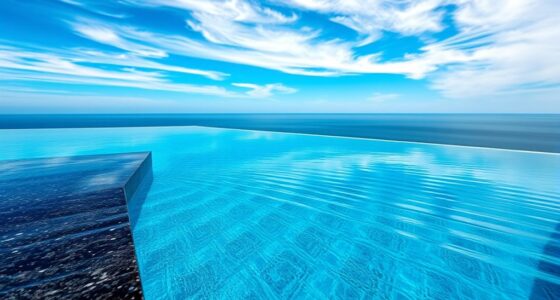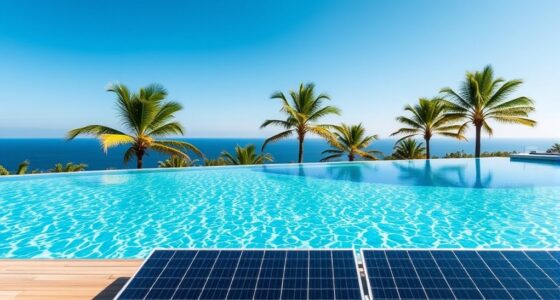Choosing between saltwater and chlorine in your infinity pool mainly affects your pool’s comfort, maintenance, and costs. Saltwater pools generate chlorine automatically, offering a softer water feel and reducing manual chemical addition, but require upfront investment in equipment. Chlorine pools give you precise control but may cause more irritation and need regular chemical adjustments. If you want to learn about the key differences and how to pick the best system, explore further insights below.
Key Takeaways
- Saltwater pools generate chlorine automatically, offering consistent disinfectant levels, while chlorine pools require manual chemical addition.
- Saltwater provides a softer, more natural water feel and greater comfort against skin and eyes compared to traditional chlorine pools.
- Maintenance differs: saltwater pools need regular salt and pH monitoring, whereas chlorine pools require precise control of multiple chemical levels.
- Initial costs for saltwater pools are higher due to equipment, but they may offer easier long-term maintenance; chlorine pools are typically less expensive upfront.
- User preference varies: saltwater pools favor ease and comfort; chlorine pools allow more immediate control of chemical levels.

Have you ever wondered whether saltwater or chlorine is better for infinity pools? It’s a common question among pool owners, especially because both options require different approaches to pool maintenance and maintaining the chemical balance. Understanding the differences can help you decide which system suits your preferences and lifestyle better.
Saltwater pools use a generator to convert salt into chlorine, providing a steady, low-level supply of disinfectant. This process often results in a softer, more natural feel to the water, which many find more comfortable against their skin and eyes. On the other hand, traditional chlorine pools rely on manually adding chlorine tablets or liquid chlorine to keep the water sanitized. While both methods aim to keep your pool clean and safe, they demand different types of chemical management.
When it comes to pool maintenance, saltwater pools tend to be more convenient over time. Since they generate chlorine automatically, you don’t need to buy or handle chlorine chemicals often. However, you still need to monitor the chemical balance regularly. Salt levels must be kept within a specific range, typically around 3000 ppm, and pH levels should be maintained between 7.2 and 7.6. If the salt concentration gets too high or low, it can affect the generator’s efficiency and overall water quality. Regular testing ensures your saltwater system functions efficiently and keeps the chemical balance stable. Additionally, chemical balance monitoring is essential for maintaining optimal water quality and equipment longevity.
Chlorine pools require diligent chemical management because chlorine levels can fluctuate due to various factors like weather, usage, or debris. You’ll need to regularly test and adjust chlorine levels to prevent bacteria growth or algae. Balancing other chemicals like pH, alkalinity, and stabilizers is equally important to avoid irritation and ensure the water remains clear. This process can be more hands-on, but it offers precise control over the water chemistry, which some pool owners prefer.
Both systems demand attention to chemical balance, but saltwater pools often need less frequent chemical addition and can be easier for casual pool owners. However, they do require initial investment in a salt chlorine generator and periodic maintenance of the equipment. Chlorine pools, while potentially more labor-intensive, give you immediate control over chemical levels and are generally less expensive upfront.
Ultimately, your choice depends on how much effort you’re willing to invest in pool maintenance and your preferences for water comfort. Both systems can provide a beautiful infinity pool experience, but understanding their differences in chemical management and maintenance needs helps you make an informed decision.
Frequently Asked Questions
Which Type Requires Less Maintenance Over Time?
You’ll find that saltwater pools generally require less maintenance over time. They maintain better chemical balance naturally, reducing the need for frequent chemical adjustments. Plus, saltwater systems tend to keep water clearer with less effort, meaning you spend less time balancing chemicals and more time enjoying your infinity pool. Over time, this translates to fewer trips to the store for chemicals and easier upkeep, making saltwater pools a more convenient choice.
How Do Saltwater and Chlorine Impact Pool Equipment Longevity?
You’ll find that saltwater systems tend to be gentler on pool equipment, thanks to their better corrosion resistance and chemical stability. While chlorine can cause more wear and tear over time, saltwater’s milder chemistry helps extend equipment life. With proper maintenance, saltwater pools often require less frequent repairs, making your investment last longer. So, choosing a saltwater system could mean fewer worries and more years of enjoying your infinity pool.
Are There Health Risks Associated With Saltwater Pools?
You should know that saltwater pools pose some health risks, especially if water safety isn’t maintained properly. The salt can cause skin irritation or eye discomfort for sensitive individuals, and there’s a chance of corrosion to pool equipment, which might lead to contamination. Regular testing and proper maintenance help minimize these risks, ensuring your pool stays safe and healthy for everyone. Always follow water safety guidelines for peace of mind.
What Is the Initial Cost Difference Between Saltwater and Chlorine Pools?
You’ll find that saltwater pools typically have a higher initial cost compared to chlorine pools, mainly due to the cost comparison of installation expenses. While chlorine pools are usually cheaper upfront, saltwater systems require purchasing and installing a salt chlorine generator, which adds to the initial investment. However, saltwater pools often have lower ongoing maintenance costs, balancing out the higher initial expenses over time.
Can Saltwater Pools Be Converted to Chlorine Pools Later?
Yes, you can convert a saltwater pool to a chlorine pool later. The process involves a pool conversion that removes the salt system and replaces it with a traditional chlorination method. Keep in mind, chemical compatibility is essential; some equipment may need adjustments or replacement to handle chlorine chemicals safely. Consulting with a pool professional ensures the conversion is smooth, and your pool remains safe and effective.
Conclusion
Ultimately, choosing between saltwater and chlorine in your infinity pool is like selecting the perfect melody—each offers its own harmony. Saltwater feels gentler on your skin, like a soothing song, while chlorine provides a reliable, upbeat rhythm. Your decision depends on what your senses crave and what aligns with your lifestyle. Whichever you choose, remember that your pool’s true magic lies in the joy it brings you—an endless symphony of relaxation waiting to be played.









